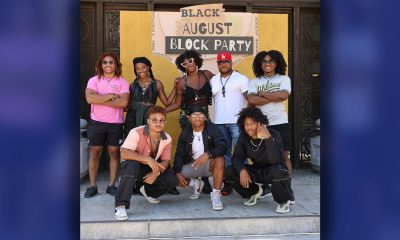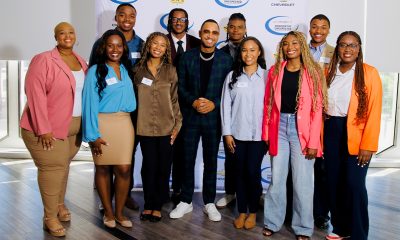The Birmingham Times
PRESS ROOM: UAB International Festival with food, music, dance and art on March 30
THE BIRMINGHAM TIMES — Celebrate cultures from around the globe when the University of Alabama at Birmingham presents the UAB International Festival on Saturday, March 30.
By Shannon Thomason, UAB News
Celebrate cultures from around the globe when the University of Alabama at Birmingham presents the UAB International Festival on Saturday, March 30.
The festival will feature food, music, art, film and cultural traditions to provide both UAB Blazers and the Greater Birmingham community a chance to “travel around the world” in a day.
Headlining performers for UAB’s International Festival are Grammy-nominated Panamanian hip-hop group Los Rakas, American-Palestinian choreographer and “So You Think You Can Dance” finalist Janelle Issis, dance company Step Afrika, and UAB African dance troop Tribe.
Guests can also look forward to a growing list of international and local food and merchandise vendors, including African Embroidery, Coconut Hut, K&J’s Pastries, Mr. Chen’s Authentic Chinese Cooking, Red Sea Ethiopian & Mediterranean Restaurant, Ruscelli’s Food Truck at Mojo Pub, Red Sea Grocery, and more.
The UAB International Festival will take place from 11 a.m.-5 p.m. at the Hill Student Center, 1400 University Blvd. Tickets are $10 for the general public, $5 for UAB faculty and staff, and free for UAB students with a valid ONE Card. Purchase tickets online and visit the UAB International Festival online at www.uab.edu/internationalfestival for information, activity and performance schedule, vendors and other important updates.
In addition to the outdoor concert and vendors, attendees can also enjoy a short-film series, interactive cultural activities, an international fashion showcase and live cultural performances, as well as family-friendly entertainment at the Kids’ Corner, sponsored by the Birmingham Museum of Art.
This article originally appeared in the Birmingham Times.
Crime
How to spot signs of, report elder abuse
THE BIRMINGHAM TIMES — Approximately one in 10 older people living in the United States has experienced physical, sexual, psychological or financial abuse or neglect, according to the National Center on Elder Abuse.
By Holly Gainer
Approximately one in 10 older people living in the United States has experienced physical, sexual, psychological or financial abuse or neglect, according to the National Center on Elder Abuse.
To understand how to keep your elderly loved ones safe, whether in your care or in the care of others, Patricia Speck, DNSc, a board-certified family nurse practitioner who specializes in forensic nursing, family and sexual violence at the University of Alabama at Birmingham School of Nursing, explains the different types of elder abuse and how to spot signs of and report suspected abuse.
Physical and sexual abuse
Physical abuse is defined as the intentional use of physical force that results in illness, injury, pain or functional impairment.
“Unexplained bruises, cuts, burns and bedsores are signs of physical abuse,” Speck explained. “If you notice sudden changes in behavior, particularly when the suspected abuser is around, that is a sign that you should seek help for your loved one.”
Speck says health care providers should suspect abuse if they see subdural hemorrhages (or bleeding that occurs outside the brain as a result of a head injury) and eye, nose and mouth injuries.
“Nurses should particularly look for signs of intentional injuries, such as contusions of lips, cheeks, soft palate, facial fractures, missing hair, particularly in odd places and not where you would expect to see balding,” Speck said. “Bruising and skin tears in odd places, like the abdomen or under the arm or in the crotch, are also common signs.”
Another common indication of abuse is for people who spend most of their time in wheelchairs.
“If there is injury to an older person who is being restrained in a wheelchair, you would look for friction burns on the abdomen or wrists, different patterns in bruising and skin tears,” Speck said.
The majority of sexual assault cases to older adults are in the community; but many are reported from institutions, and in most cases the perpetrator is known by the victim.
Speck says signs of sexual abuse include unexplained venereal diseases, genital infections, and bleeding and tearing in the genital area. They also include bruises to the buttocks and around the inner and outer thighs.
Psychological abuse
Psychological abuse is one of the most common types of abuse. Suspected signs include unusual changes in behavior or sleep, fear or anxiety, sadness, and isolation.
“Isolation is one of the worst symptoms of psychological abuse,” Speck said. “Many older people who are being abused by a loved one don’t want to tell other people what their son or daughter is doing to them because it is their child. This leaves the victim feeling very alone and depressed.”
Speck says control is a major issue in psychological abuse.
“The abuse could come in the form of scolding, insults and degradation; but it could also be less obvious to see,” Speck said. “For example, if a loved one or caretaker keeps a walker or wheelchair just out of reach of the person so they can’t get up and around. Another example might be withholding glasses or dentures from the patient so they can’t eat or see.”
Common signs of abuse may occur when one notices that the patient is unwilling to communicate when a certain person is in the room or nearby.
“If you suspect abuse and are speaking to the patient as part of an investigation or as a friend or relative who is concerned, and you notice the older person’s behavior changes, that should be a major indicator of abuse,” Speck said. “The problem is that moving an older person from their living environment may be disorienting. It takes time to figure out what happened.”
Financial abuse
Financial abuse is defined as the illegal or impromptu use of an elder’s funds, property or assets. Examples include forging an older person’s signature, coercing an older person into signing documents, such as a contract or will, and the improper use of power of attorney.
Speck says financial abuse is common among seniors, especially those with dementia or cognitive impairment; but despite their mental state, the best thing to do is believe them when they complain of missing funds.
“When an older person complains, believe them and listen to them,” she said. “If a loved one is in an assisted-living facility and complains that things are missing, pay attention to that. It is important to do this until you have evidence to prove otherwise.”
Not listening or disregarding complaints about financial abuse will cause the victim to feel shame for not being believed and will also create fear and skepticism when it comes to reporting future instances of abuse. Providers want to create a trauma-informed safe environment.
Neglect
According to Speck, there are three types of neglect — physical, emotional and self.
“Physical neglect is defined as failing to attend to a person’s medical hygiene, nutrition and dietary needs,” she said. “It may also involve not giving them the medications they’ve been prescribed or not changing their bandages on time.”
Emotional neglect also causes pain and distress.
“We often see emotional neglect when an older person is infantilized by their caregivers,” she said. “Abandonment is also a common problem, where someone is left at an emergency department or the hospital.”
Self-neglect is a growing concern and appears when a person chooses not to be treated by a health care provider. Signs of self-neglect include attempted suicide, withdrawal, anxiety, psychosomatic ailments such as stomachaches and headaches, and difficulty sleeping. The older person may desire to be alone, but social support is so important to the older person’s health.
What to do if you see signs of abuse
As the elderly population continues to grow, understanding the signs and symptoms of abuse is an important way to care for your loved ones. Speck says the best thing to do is to be gentle and listen.
“Older people need you to be patient with them, so be patient and listen twice as long as you speak,” she said.
When communicating with an older person whom you suspect has been abused, make sure the person knows what you are saying. If a document or something they need to read is involved, make sure the letters are large enough so they can read the print.
Also, use trauma-informed care principles of safety and transparency to communicate with them in a place where they feel comfortable, and ask them about their hearing and vision preferences.
“They may not be able to see well in a bright room, or they may be sensitive to loud speech and need you to speak in a slow, calm manner using their language,” Speck said. “Avoid medical-ese. Ask them if they have any difficulties, and offer to help them make the environment safer for them. They will be more cooperative and trust you if you show that you are putting their needs first.”
If you suspect abuse, talk with them when the two of you are alone. Offer to take that person to get help and let them know you are worried about their safety and well-being. Many communities have Coordinated Community Responses to Elder Abuse, with a variety of services for the older person. Be proactive, identify older persons at risk, and participate in the development of Coordinated Community Responses to elder maltreatment. In Alabama, Adult Protective Services supports and enables county departments to protect elderly and disabled adults from abuse, neglect and exploitation and to prevent unnecessary institutionalization.
In Alabama, to report abuse, neglect and exploitation of elders or vulnerable adults:
- IMMEDIATE DANGER? Call 911 if that person is in immediate, life-threatening danger.
- Call the HOTLINE at 1-800-458-7214 to report abuse, neglect and exploitation of elders or vulnerable adults when suspicious.
- For services to support elder persons in your community, call 1-800-677-1116 TO PREVENT, the Eldercare Locator (a public service of the U.S. Administration on Aging), to speak with someone who will connect you to services for older adults and their families and prevent abuse, neglect and exploitation of elders or vulnerable adults.
This article originally appeared in The Birmingham Times.
Education
City’s Young Basketball Talent on Display at Skills Clinic
THE BIRMINGHAM TIMES — Dozens of area children were at A.H. Parker High School on Friday for a basketball skills clinic as part of the Young3, an initiative for children ages 7-14. Young3 is part of BIG3, a professional 3-on-3 basketball league that came to Birmingham on Saturday.
By Time Staff Report
Dozens of area children were at A.H. Parker High School on Friday for a basketball skills clinic as part of the Young3, an initiative for children ages 7-14.
Young3 is part of BIG3, a professional 3-on-3 basketball league that came to Birmingham on Saturday.
“Our goal with this [Young3] program is to inspire youth across the nation to shoot for their dreams,” said Jerome Williams, president of the Young3 initiative and former NBA global ambassador and 9-year NBA veteran.
Ronnie Rice, board member of the Boys & Girls Clubs of Birmingham and attorney with the Alexander Shunnarah Law Firm, said, “Every day at our Boys & Girls Clubs, we encourage our members to live an active lifestyle. The Young3 initiative from the BIG3 is an exciting opportunity, not only for our members to learn more about the game of basketball from professionals, but to have a great time doing it.”
The Young3 looks to advance 3-on-3 basketball in each of the local communities it visits, but also looks to enrich a child’s experience with the game of basketball.
The following clinic participants were named to the Young3 All-Tournament Team: Christian Milteer, Terrance Atkins, Shelly Millender IV, Reagan Casper, Kamil Goodman, and Madrecus “Drec” Moreland, who was named MVP.
Some of the notable locals who attended throughout included Sheriff Mark Pettway, Kelvin Datcher of the City of Birmingham Mayor’s Office, DJ Chocolate, Principal Darrell Hudson of A. H. Parker High School, and Jay Johnson who is with College Prep U.
This article originally appeared in The Birmingham Times.
Entertainment
Rickey Smiley To Take Over Tom Joyner Morning Show
THE BIRMINGHAM TIMES — Birmingham native Rickey Smiley will take over The Tom Joyner Morning Show when Joyner retires at the end of the year. Joyner said that Smiley has established himself as a trusted leader on-air and in the community with his current show, captivating audiences with his authentic humor but also his unique perspective on topics important to his audience.
By Times Staff Report
Birmingham native Rickey Smiley will take over The Tom Joyner Morning Show when Joyner retires at the end of the year.
Joyner said that Smiley has established himself as a trusted leader on-air and in the community with his current show, captivating audiences with his authentic humor but also his unique perspective on topics important to his audience.
“I’m happy to see the landscape of Urban Adult Contemporary morning radio continue to expand with Rickey, and I’m proud of the doors the Tom Joyner Morning Show opened,” said Joyner. “Twenty-five years ago, there was no template for a syndicated Urban radio show and we worked hard to prove that we could successfully produce and market a national platform that would entertain, inform and empower African- American listeners.”
Smiley, who attended Alabama State University, also announced that Eva Marcille and Gary Wit Da Tea would be among the on-air cast members joining him to broadcast out of the Dallas studios beginning January 2020.
“It’s an honor to continue the legacy of my boss and frat brother Tom Joyner,” said Smiley. “Not only has he been a friend to my family and me over the years, but we consider him family. Tom’s mentorship has instilled in me valuable wisdom that I will carry with me through this new morning show.”
Additional details about the show will be shared in the coming months.
www.987.kiss.com contributed to this post.
This article originally appeared in The Birmingham Times.
-

 Activism4 weeks ago
Activism4 weeks agoUndocumented Workers Are Struggling to Feed Themselves. Slashed Budgets and New Immigration Policies Bring Fresh Challenges
-

 Activism2 weeks ago
Activism2 weeks agoWe Fought on Opposite Sides of the Sheng Thao Recall. Here’s Why We’re Uniting Behind Barbara Lee for Oakland Mayor
-

 Activism4 weeks ago
Activism4 weeks agoOakland Post: Week of March 5 – 11, 2025
-

 #NNPA BlackPress2 weeks ago
#NNPA BlackPress2 weeks agoRev. Dr. Jamal Bryant’s Black Church Target Boycott Mobilizes 150,000
-

 Activism2 weeks ago
Activism2 weeks agoSan Francisco Is Investing Millions to Address Food Insecurity. Is Oakland Doing the Same?
-

 #NNPA BlackPress4 weeks ago
#NNPA BlackPress4 weeks agoTrump Moves to Dismantle Education Department
-

 #NNPA BlackPress4 weeks ago
#NNPA BlackPress4 weeks agoFighting to Keep Blackness
-

 #NNPA BlackPress2 weeks ago
#NNPA BlackPress2 weeks agoRecently Approved Budget Plan Favors Wealthy, Slashes Aid to Low-Income Americans

























































